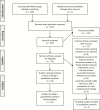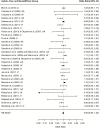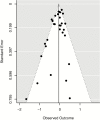Use of Mentholated Cigarettes and Likelihood of Smoking Cessation in the United States: A Meta-Analysis
- PMID: 31204787
- PMCID: PMC7161928
- DOI: 10.1093/ntr/ntz067
Use of Mentholated Cigarettes and Likelihood of Smoking Cessation in the United States: A Meta-Analysis
Abstract
Introduction: Previous qualitative reviews have summarized evidence of an association between menthol cigarette use and likelihood of smoking cessation. The objective of this meta-analysis was to provide a quantitative summary of effect sizes, their variability, and factors related to the variability in effect size for the association between menthol use and likelihood of smoking cessation.
Methods: We systematically searched Medline, PsycINFO, and Embase for prospective and cross-sectional studies of the association between menthol use and smoking cessation. We analyzed data with random effects meta-analyses and meta-regression.
Results: Our review identified 22 reports from 19 studies of the association between menthol use and cessation. All identified study samples included only US smokers, with one exception that included both Canadian and US smokers. Our overall model did not demonstrate a significant association between menthol use and cessation; however, menthol users were significantly less likely to quit among blacks/African American smokers (odds ratio = 0.88).
Conclusions: Among blacks/African Americans predominantly in the US menthol users have approximately 12% lower odds of smoking cessation compared to non-menthol users. This difference is likely the result of the tobacco industry's ongoing marketing influence on the black/African American Community, suggesting that a menthol ban may have a unique public health benefit for black/African American smokers by encouraging quitting behavior.
Implications: This study adds a quantitative summary of the association between menthol cigarette use and smoking cessation in the United States. Findings of an association with lower likelihood of cessation among black/African American smokers, likely resulting from the tobacco industry's marketing influence, support the ban of menthol flavoring as part of a comprehensive tobacco control effort to increase cessation among black/African American smokers.
© The Author(s) 2019. Published by Oxford University Press on behalf of the Society for Research on Nicotine and Tobacco. All rights reserved. For permissions, please e-mail: journals.permissions@oup.com.
Figures




References
-
- U.S. Department of Health and Human Services. The Health Consequences of Smoking—50 Years of Progress: A Report of the Surgeon General 2014. https://www.surgeongeneral.gov/library/reports/50-years-of-progress/inde.... Accessed December 7, 2018.
-
- Jamal A, Agaku IT, O’Connor E, King BA, Kenemer JB, Neff L. Current cigarette smoking among adults—United States, 2005–2013. MMWR Morb Mortal Wkly Rep. 2014;63(47):1108–1112. http://www.ncbi.nlm.nih.gov/pubmed/25426653. Accessed December 7, 2018. - PMC - PubMed
-
- Centers for Disease Control and Prevention (CDC). Quitting smoking among adults--United States, 2001–2010. MMWR Morb Mortal Wkly Rep. 2011;60(44):1513–1519. http://www.ncbi.nlm.nih.gov/pubmed/22071589. Accessed December 7, 2018. - PubMed
-
- Ward BW, Clarke TC, Freeman G, Schiller JS. Early Release of Selected Estimates Based on Data from the January–September 2014 National Health Interview Survey https://stacks.cdc.gov/view/cdc/28996. Accessed December 7, 2018.
Publication types
MeSH terms
Substances
Grants and funding
LinkOut - more resources
Full Text Sources
Medical

